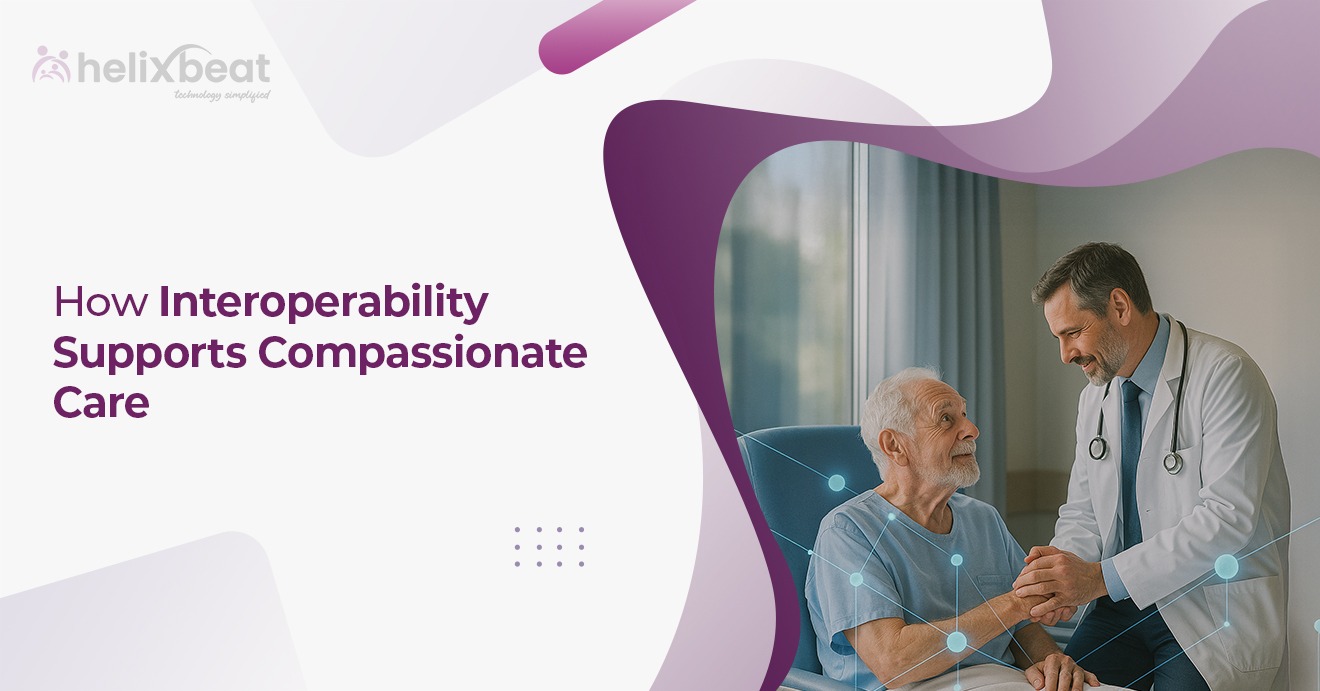In healthcare, compassion is a core value. For patients facing serious health challenges, medical expertise is important, but so is empathy and personalized care. However, providing this kind of care is tough without smooth communication and collaboration between different healthcare systems. That’s where interoperability comes in.
In this blog, we’ll discuss how interoperability can boost compassionate care by encouraging teamwork, improving patient outcomes, reducing mistakes, and building trust.

Table of Contents
What is Interoperability in Healthcare?
Simply put, interoperability refers to the ability of different healthcare systems, applications, and devices to work together and exchange information seamlessly. In healthcare, this means securely sharing patient data between electronic health records (EHR), laboratory information systems, radiology systems, pharmacy systems, and more.
The goal is to break down data silos and create an interconnected network that supports the flow of critical health information across various providers. When healthcare systems are interoperable, healthcare providers have a more holistic view of a patient’s medical history, treatments, and needs.
How Interoperability Fuels Compassionate Care
1. Facilitating Real-Time Data Sharing for Faster Decision-Making
Imagine a scenario where a patient arrives at the emergency room with symptoms that could indicate a serious condition. If the hospital’s systems are not interoperable with other healthcare providers, it may take time to gather the patient’s medical history, previous diagnoses, and medications. This delay could have serious implications, especially when time-sensitive decisions are needed.
However, interoperability allows real-time access to patient data, even from remote locations. For example, if a patient has had prior heart procedures or has a history of chronic conditions, this information can be instantly accessed by the emergency room team. As a result, the patient can receive immediate and compassionate care, even during critical moments.
2. Promoting Continuity of Care Across Providers
Compassionate care doesn’t just happen in a hospital setting; it extends across a patient’s entire healthcare journey. Patients often move between different healthcare providers, and without interoperability, there’s a risk of fragmented care.
For example, imagine a diabetic patient who receives care from both a primary care physician and an endocrinologist. If these two providers cannot access each other’s data, the patient may undergo redundant tests or even experience conflicting treatment recommendations. However, if both providers can view the patient’s complete medical history, they can collaborate and deliver care that addresses the patient’s needs holistically. This continuity of care not only leads to better medical outcomes but also enhances the patient’s experience.
3. Streamlining Care Coordination for Better Patient Outcomes
Coordinating care for patients with conditions like cancer or multiple chronic illnesses often involves multiple specialists. These specialists may not always work within the same healthcare system or hospital network.
Interoperability solves this problem by creating an environment where all specialists involved in a patient’s care can access and contribute to a centralized health record. For example, a cancer patient who is receiving chemotherapy, radiation therapy, and pain management treatment from multiple providers will benefit from all providers accessing the same records. This seamless exchange of information helps avoid duplicating tests, prevents conflicting treatments, and ensures a comprehensive approach to care.
4. Enhancing the Patient Experience with Personalized Care
Interoperability also empowers healthcare providers to deliver personalized care. For example, a primary care physician who has access to a patient’s immunization history, past surgeries, and current treatments can tailor recommendations more accurately. This thoughtful approach demonstrates that the provider values the patient’s time and well-being, which enhances the overall experience.
Moreover, interoperable systems allow healthcare providers to integrate patient preferences regarding treatment options. For example, a patient undergoing a treatment plan for a chronic illness may have specific preferences regarding how they wish to receive care—whether that be through more frequent check-ins, alternative therapies, or a particular communication method. When this information is accessible across different care settings, the treatment becomes more personalized and demonstrates respect for the patient’s wishes.
5. Building Trust Through Transparent Communication
Transparency in healthcare is a key component of compassionate care. When patients are informed about their conditions, treatment options, and the decisions being made about their care, they are more likely to feel at ease and confident in their healthcare team.
Interoperability promotes transparency by allowing patients to access their health records through online portals or apps. This transparency can be especially beneficial in chronic disease management, where patients need to stay on top of multiple aspects of their health. By empowering patients to view their test results, track their medications, and monitor their health metrics, interoperability enhances patient autonomy and reduces feelings of helplessness.
AERIS: Powering Compassionate Care Through Real-Time Data Sharing
In healthcare, where every second matters—AERIS by Helixbeat makes it possible for providers to act quickly. This FHIR-based interoperability solution helps hospitals, clinics, labs, and pharmacies to exchange patient data seamlessly in real-time, bridging the gap between fragmented systems and unified, compassionate care.
Key features of AERIS include
- Fast and Reliable Data Exchange: Enables instant communication between heterogeneous systems, improving care coordination and patient outcomes.
- Standards-Driven Architecture: Fully compliant with FHIR and other interoperability protocols to maximize compatibility and future-proof your infrastructure.
- Secure and Compliant: Incorporates robust security measures and privacy controls aligned with healthcare regulations.
- Scalable and Flexible: Easily integrates with existing IT landscapes and scales with your organization.
Whether it’s reducing repeated tests or improving cross-specialty communication, AERIS is redefining what compassionate care looks like in the digital age.
Final Thoughts
Interoperability is not just about technology; it is about transforming the way healthcare is delivered to improve outcomes, reduce risks, and create a more compassionate experience for patients. By enabling seamless communication and collaboration among healthcare providers, interoperability ensures that every patient receives comprehensive, timely, and personalized care.
Reach out to our experts to see how AERIS can fit into your digital transformation journey.
FAQs
1. How does interoperability support compassionate care?
Interoperability helps healthcare providers collaborate more effectively, share real-time data, and deliver personalized care. It reduces errors, enhances patient safety, and ensures continuity of care across different healthcare providers and settings.
2. How does AERIS improve patient outcomes?
By enabling seamless data exchange, AERIS allows healthcare providers to make quicker, more accurate decisions, reduce redundant testing, and offer personalized care. It also enhances collaboration between specialists, resulting in better treatment coordination and patient outcomes.
3. What is FHIR, and why is it important for healthcare interoperability?
FHIR (Fast Healthcare Interoperability Resources) is a standard for exchanging healthcare information electronically. It enables healthcare systems to communicate in a consistent and secure manner, making it easier for various healthcare providers to access and share patient data in real time.
4. What are the benefits of real-time data sharing in healthcare?
Real-time data sharing allows healthcare providers to make quicker and more informed decisions, improving patient outcomes. It also reduces delays in treatment, prevents redundant tests, and fosters better collaboration across various care providers.
5. Can AERIS be integrated with existing healthcare systems?
Yes, AERIS is designed to integrate seamlessly with existing healthcare systems, including electronic health records (EHR), lab systems, and pharmacy platforms. It uses FHIR standards to enable smooth communication and data sharing across different systems.














